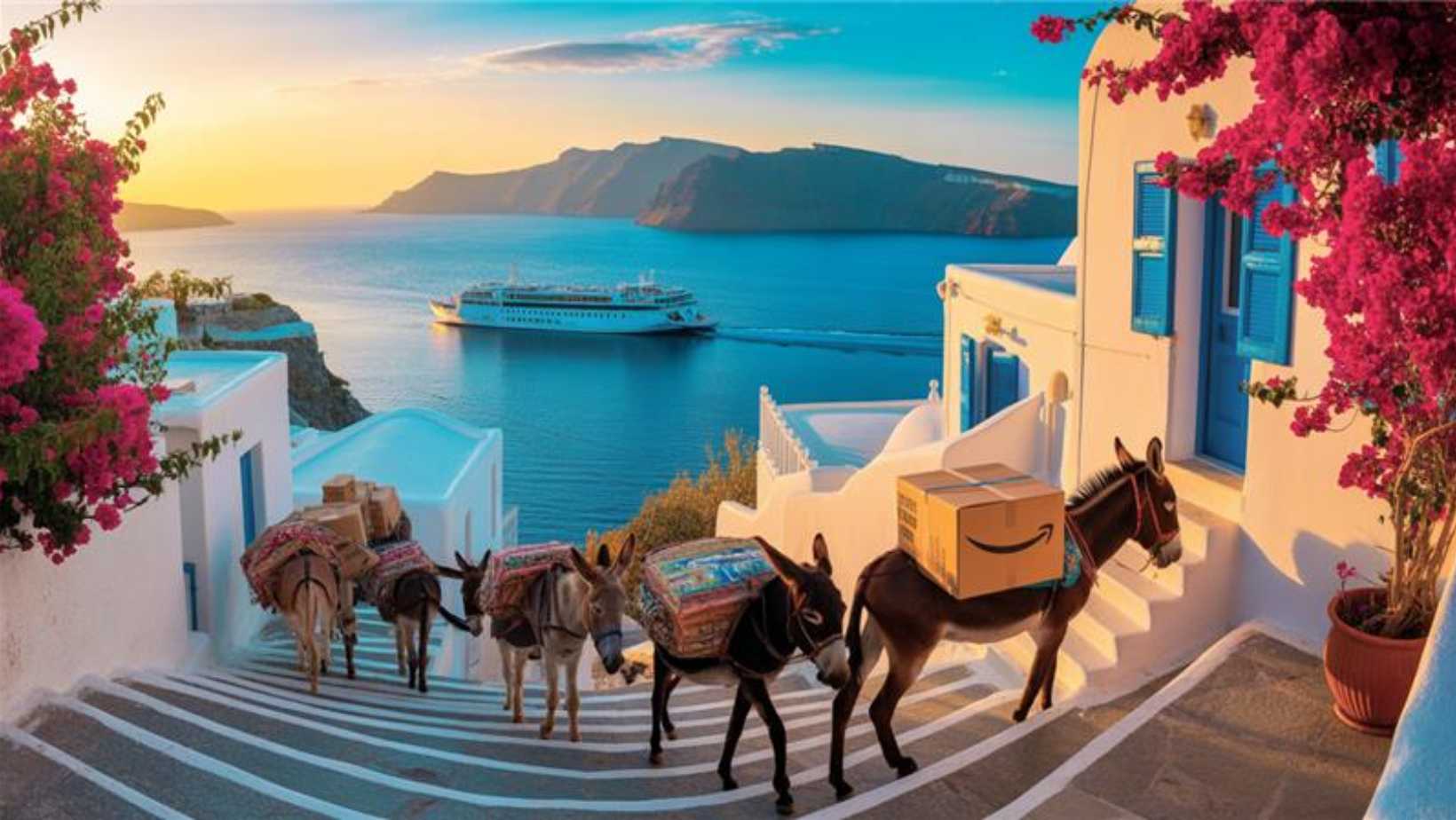Picture Amazon Prime deliveries arriving on four hooves instead of four wheels. On this small Saronic island, your online shopping arrives strapped to the back of a donkey, navigating centuries-old stone steps that no vehicle could ever climb. The 2,800 residents have mastered an art that Silicon Valley can’t replicate: thriving in the 21st century without a single private car, while maintaining one of Greece’s most sophisticated logistics networks.
The morning ferry from Piraeus brings everything from refrigerators to fresh bread, but that’s where conventional delivery ends. At the port, a fleet of 600 working donkeys takes over, their handlers expertly loading washing machines, furniture, and grocery bags onto wooden saddles designed centuries ago. The absence of motorized transport isn’t poverty or backwardness – it’s a deliberate choice that has created one of Europe’s healthiest communities.
Walking these marble-paved alleys at dawn, you’ll witness a supply chain that would fascinate any logistics expert. Construction materials for hillside renovations travel piece by piece on donkey backs, while taverna supplies navigate paths barely wide enough for two people to pass.
The donkeys know every doorstep and their handlers have memorized which animal suits each delivery route
Each morning begins with what locals call “the donkey rush hour” – between 7 and 9 AM, these four-legged delivery trucks fan out across the island’s 50 square kilometers. The experienced animals know their routes so well that handlers often let them walk ahead unguided to familiar addresses. A donkey named Yorgos has been delivering to the same hillside homes for twelve years, navigating 264 stone steps without hesitation.
The system handles everything modern life requires. IKEA furniture arrives in flat-pack boxes perfectly sized for donkey transport, while supermarket orders get sorted into balanced loads at the port warehouse. Even emergency medical supplies reach the island’s clinic this way, with specially trained “express donkeys” reserved for urgent deliveries.
What amazes first-time visitors isn’t just the novelty – it’s the efficiency. Deliveries that would take hours in traffic-clogged Athens arrive at doorsteps here in 30 minutes. The donkey handlers, many third-generation in their trade, have developed a complex scheduling system that rivals any modern app.
Living here means rediscovering your legs and learning that silence after sunset isn’t emptiness but luxury
The absence of car engines creates a soundscape extinct elsewhere in Europe. Conversations carry across courtyards, church bells mark time without competition, and the clip-clop of hooves on stone becomes the island’s heartbeat. Residents walk an average of 8 kilometers daily – not for exercise, but simply living their lives.
This car-free existence has unexpected benefits. Children play freely in the streets, elderly residents maintain mobility longer without car dependence, and the community’s carbon footprint rivals that of pre-industrial villages. The local doctor reports respiratory illness rates 70% lower than mainland Greece, while stress-related conditions are virtually unknown.
Evening brings a rhythm lost to motorized societies. Without headlights piercing the darkness, stars emerge in numbers that shock urban visitors. The absence of traffic creates space for human connection – neighbors chat from balconies, tavernas spill into streets, and the whole island becomes one extended living room.
This sustainable model attracts architects and urban planners studying how ancient wisdom solves modern problems
Universities from MIT to Stockholm send researchers to study this functioning car-free society. The island proves that eliminating automobiles doesn’t mean sacrificing modern amenities – residents enjoy high-speed internet via underwater cables, modern healthcare, and access to global goods. They’ve simply chosen a different delivery method.
The economic model fascinates economists too. The 600 working donkeys support 150 handler families, creating more jobs than a mechanized system would. Tourists seeking authentic experiences pay premium prices for accommodations, with the island’s small hotels booked solid from May through October. Unlike mass tourism destinations, visitor numbers are naturally limited by ferry capacity and accommodation scarcity.
Local businesses have adapted brilliantly. Restaurants receive ingredients in donkey-friendly portions, construction projects use traditional materials that arrive in manageable loads, and even modern renovations incorporate this ancient logistics system. The island’s only vehicles – three small garbage trucks and an ambulance – operate on restricted schedules that preserve the peaceful atmosphere.
This Greek island offers something increasingly rare: proof that progress doesn’t always mean more technology. Sometimes it means choosing which innovations truly improve life and which ones we’re better off without. Here, where donkeys deliver your groceries and silence is a luxury good, the 21st century has arrived – it just looks different than anywhere else.
